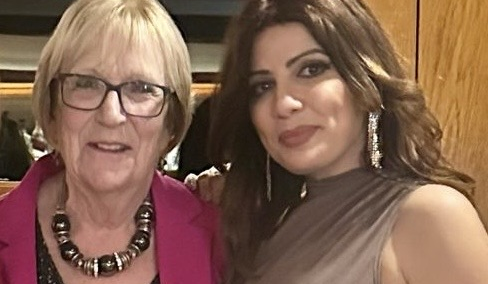News
Nour Norris on names in DHRs 17th May 2024
29/08/2024

This week Nour Norris, aunt of Raneem Oudeh and sister of Khaola Saleem who were murdered in 2018, was informed their names would not appear in the review into their deaths.
Raneem Oudeh and Khaola Saleem were murdered by Raneem's former partner in 2018. Nour who is Raneem's aunt and Khaola's sister has been asking for their names to be included. Despite the fact that many DHRs use the victims names the Community Safety Partnership refused. Nour tells us why she is devastated by this decision and why names are so important.
"In the world of Domestic Homicide Reviews (DHRs), where every detail counts, there's one crucial element often overlooked—the power of a name. As I advocate for my sister and niece to be recognised in the DHR process, I'm reminded that their names aren't just labels; they're echoes of lives tragically cut short by domestic violence. Join me on this journey as we explore why naming names isn't just about paperwork—it's about giving voices to the silenced and ensuring their stories shape a safer future.
A Domestic Homicide Review (DHR) is a detailed examination of the circumstances surrounding the death of a person as a result of domestic violence, aimed at identifying what can be learned to prevent similar incidents in the future. I am advocating for my sister and niece's names to be included in the DHR because the findings and insights from the report will lack the necessary impact without their names attached to it. Naming the report after my sister, Renee Khaola, gives them a voice—a voice that was tragically silenced by the circumstances of the failure leading to their death.
My sister and niece's voices were not heard when they were alive, and this lack of recognition contributed to their tragic fate. Omitting their names from the report makes it feel like their voices are being silenced again. This undermines the significance of the report's findings and perpetuates the same mistakes that led to their deaths.
I am profoundly disappointed and upset by this omission, and I am committed to fighting for their names to be published and their voices to be heard. It's not just about honouring their memory but also about ensuring that their experiences contribute meaningfully to preventing similar tragedies in the future."
Sue Haile who is part of our team, has worked with Nour as her advocate since the beginning and cannot understand this hurtful decision. Sue has recently completed her PhD looking at the importance of victim's voices in DHRs and she says that this decision goes against the Home Office guidance that stipulates that victim voices must be central to domestic homicide reviews. She says "many other reviews include the names of victims we cannot understand why this decision was taken".